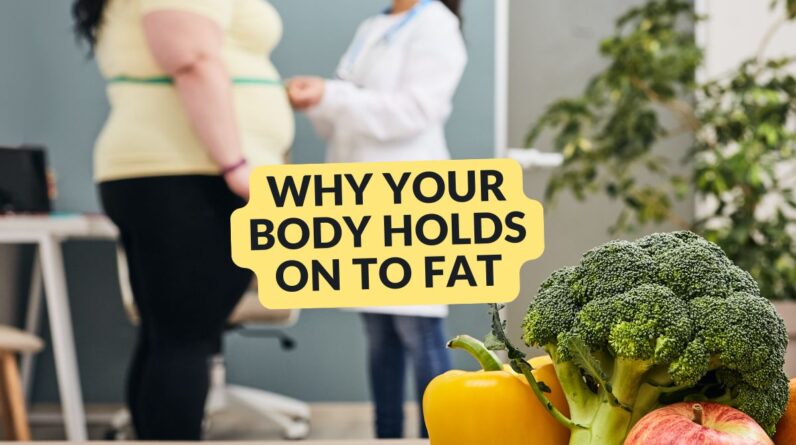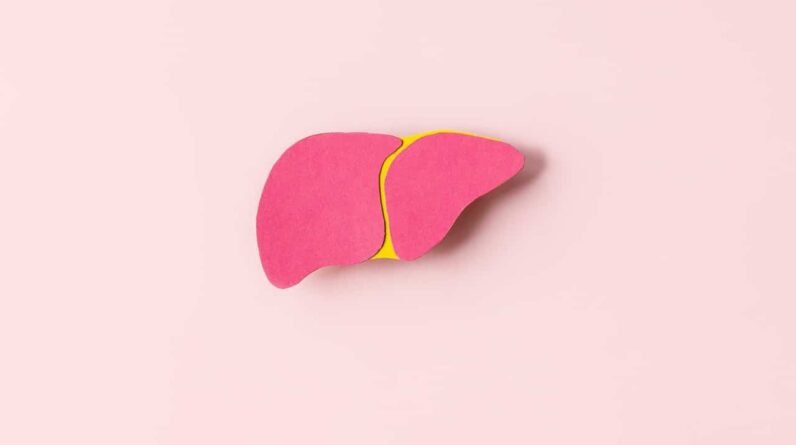
Ever feel like your body is holding on to fat like it’s some kind of prized possession? You count your calories, hit the gym, and swear off late-night snacks, yet the scale barely moves.
Meanwhile, someone else claims they “just stopped drinking soda” and suddenly drops 20 pounds.
If you’ve been told to just eat less and move more, you’re probably ready to scream. You’re already in a calorie deficit, doing everything by the book, yet your body refuses to cooperate. It’s like it didn’t get the memo that fat is supposed to leave.
Here’s the thing—your body isn’t a simple math equation. Not all calories are equal, and fat loss isn’t just about burning more than you eat.
Stress, sleep, hormones, and gut health all play a massive role in how your body holds onto or lets go of fat. And if even one of these is out of whack, your body can decide it’s better off keeping the fat for your own good.
Some of the biggest hidden factors making fat loss harder include:
- Chronic stress and high cortisol, which signal your body to store fat.
- Inflammation, making your metabolism sluggish.
- Insulin resistance, keeping your body in fat-storing mode.
- Hormonal imbalances, especially as you get older.
- Poor sleep, disrupting hunger and fat-burning hormones.
- Gut health issues, affecting how your body processes food.
- Nutrient deficiencies, slowing metabolism and energy levels.
- Overtraining and under-eating, stressing your body into fat storage.
If any of this sounds familiar, you’re not imagining things. Fat loss is about way more than just calories.
Keep reading as we dig into each of these factors and how to fix them so your body stops holding on to fat like it’s never letting go.
This post may contain affiliate links, which helps keep this content free. Please read our disclosure for more info.
Chronic Stress and High Cortisol
Stress isn’t just an annoying part of life, it’s a fat-storing nightmare. Your body is wired for survival, and when stress levels stay high, it reacts by releasing more cortisol, the “fight or flight” hormone.
In short bursts, cortisol helps you stay alert and respond to challenges. But when it stays elevated for too long, it signals your body to store fat, especially around your midsection.
High cortisol doesn’t just affect fat storage. It also ramps up cravings for sugar and processed carbs, making it easier to overeat and harder to stick to healthy choices. Over time, chronic stress can lead to insulin resistance, which means your body has trouble using carbohydrates properly and ends up storing more of them as fat.
If you’re constantly stressed, struggling with belly fat, and dealing with stubborn weight that won’t budge no matter what you do, cortisol could be the culprit.
What to Do About It
✔ Prioritize sleep and relaxation. Aim for 7-9 hours of quality sleep each night. Poor sleep raises cortisol and makes cravings worse. Set a bedtime routine, limit screen time before bed, and keep your bedroom cool and dark.
✔ Get outside and move. Gentle movement like walking, yoga, or stretching can lower cortisol levels without putting additional stress on your body. Bonus points if you do it outside! Sunlight and fresh air help regulate stress hormones.
✔ Try magnesium, ashwagandha, or other adaptogens. Magnesium helps relax your nervous system, while adaptogens like ashwagandha and rhodiola support stress resilience and help bring cortisol back to normal levels.
✔ Cut back on excessive caffeine and late-night scrolling. Too much caffeine, especially in the afternoon or evening, can keep cortisol levels high. Swap out that extra cup of coffee for herbal tea or decaf in the afternoon. Blue light from screens also disrupts sleep and increases stress hormones, so give yourself at least 30-60 minutes of screen-free time before bed.
✔ Do something fun. Laughter and enjoyable activities help lower cortisol naturally. Whether it’s a hobby, watching a funny show, or spending time with people you love, make space for things that bring you joy.
Reducing stress won’t happen overnight, but small changes add up. The goal isn’t to eliminate stress completely (because that’s impossible) but to manage it in a way that helps your body feel safe enough to let go of stored fat.
Related article: Do You Need a Cortisol Detox?
Inflammation That Won’t Quit
Inflammation is more than just sore joints or post-workout soreness. It’s your body’s natural defense system, designed to protect you from infections and injuries. But when inflammation sticks around long-term, it becomes a major roadblock to fat loss.
Chronic inflammation tells your body that something is off, so it shifts into protection mode by slowing metabolism, making fat loss harder, and even increasing fat storage as a survival response. High inflammation levels can also cause insulin resistance, making it easier to store fat and harder to burn it.
How do you know if inflammation is an issue? Signs include bloating, puffiness, water retention, stubborn fat that won’t budge, brain fog, and constant fatigue.
If you feel inflamed no matter what you eat or how much you exercise, your body might be stuck in a state of low-grade, chronic inflammation.
What to Do About It
✔ Eat more anti-inflammatory foods. Focus on whole foods that help fight inflammation, like salmon, sardines, avocados, berries, dark leafy greens, turmeric, ginger, and extra virgin olive oil. These foods contain antioxidants and healthy fats that help calm inflammation.
✔ Ditch ultra-processed foods and seed oils. Processed foods filled with refined sugar, artificial additives, and inflammatory oils (like soybean, canola, and corn oil) trigger inflammation and make fat loss harder. Stick to real, whole foods as much as possible.
✔ Get enough omega-3s. Omega-3 fatty acids help balance inflammation, but most people don’t get enough. Wild-caught fatty fish (like salmon and sardines) are the best sources, but if you don’t eat fish regularly, consider a high-quality fish oil supplement.
✔ Support gut health. Since inflammation often starts in the gut, keeping your digestive system healthy is key. Eat probiotic-rich foods like yogurt, kefir, kimchi, and sauerkraut, and include prebiotic foods (like garlic, onions, and asparagus) to feed the good bacteria.
✔ Prioritize sleep and stress management. Prioritize 7-9 hours of quality sleep each night, since even one bad night can spike inflammation. Manage stress with activities like walking, meditation, or deep breathing, and be mindful of overtraining. Too much high-intensity exercise can actually increase stress hormones and keep inflammation levels high.
Lowering inflammation isn’t just about fat loss, it’s about helping your body function better overall. The more you support your body with anti-inflammatory foods and lifestyle habits, the easier it will be to burn fat and feel good.
Insulin Resistance Blocking Fat Burning
If you feel like you’re always hungry, constantly craving carbs, and struggling with stubborn belly fat, insulin resistance could be part of the problem. Insulin is the hormone that helps move sugar from your bloodstream into your cells for energy.
But when insulin levels stay high, often due to too many refined carbs, frequent snacking, or high stress, your body becomes less responsive to it. Instead of burning stored fat for fuel, it stays in fat-storing mode.
Insulin resistance doesn’t just make fat loss harder. It also leads to energy crashes, increased cravings, and hunger shortly after meals.
If you often feel like you need something sweet after eating or struggle with an afternoon slump, your body might not be processing carbs efficiently.
What to Do About It
✔ Balance your meals with protein, healthy fats, and fiber. These nutrients help slow down blood sugar spikes and keep insulin levels steady. Prioritize whole, unprocessed foods like lean meats, eggs, avocado, nuts, and non-starchy vegetables.
✔ Strength train to improve insulin sensitivity. Lifting weights or doing resistance exercises helps your muscles use glucose more efficiently, reducing insulin resistance over time. Even a few short strength workouts a week can make a big difference.
✔ Avoid snacking all day. Frequent eating keeps insulin levels elevated, making it harder for your body to switch into fat-burning mode. Give yourself breaks between meals and consider intermittent fasting if it works for you.
✔ Reduce processed carbs and added sugars. Swap out refined grains and sugary snacks for whole, fiber-rich options like vegetables, berries, and high-quality protein sources. Keeping blood sugar stable helps prevent insulin spikes.
When insulin resistance improves, your body becomes much better at burning fat instead of storing it, and cravings start to fade.
Hormonal Imbalances (Especially for Women Over 40)
Hormones control everything from metabolism to fat storage, and as you get older, they don’t always play nice. If they’re out of balance, fat loss becomes a lot harder, no matter how well you eat or how much you exercise.
For many women over 40, estrogen dominance is a big issue. When estrogen is too high compared to progesterone, fat tends to settle in the hips, thighs, and lower belly. It can also lead to bloating, water retention, and stubborn weight gain that doesn’t respond to normal diet and exercise.
At the same time, low progesterone can leave you feeling more stressed, anxious, and wired at night, making sleep harder (which only makes fat loss more difficult).
Then there’s the thyroid, which controls metabolism. If it’s underactive, whether from nutrient deficiencies, stress, or perimenopause, it slows everything down, making it feel like no amount of effort will move the scale.
Low thyroid function can also cause fatigue, brain fog, and dry skin, so if fat loss is stalling and you’re feeling off, your thyroid could be part of the problem.
What to Do About It
✔ Get your hormone levels checked. You won’t know what’s off until you test. A full panel for estrogen, progesterone, testosterone, cortisol, and thyroid function (including T3, T4, and TSH) can give you a clear picture.
✔ Eat a nutrient-dense diet with enough protein and healthy fats. Your body needs the right building blocks to keep hormones balanced. Focus on high-quality protein, omega-3s, and hormone-supporting foods like eggs, avocados, and leafy greens.
✔ Support your thyroid with iodine, selenium, and zinc. These nutrients are crucial for thyroid function. Get them from foods like wild-caught fish, Brazil nuts, seaweed, and grass-fed beef, or supplement if needed.
✔ Manage stress, since cortisol can throw everything out of balance. High cortisol disrupts estrogen, progesterone, and thyroid hormones. Reduce stress with relaxation techniques, gentle movement, and consistent sleep.
✔ Consider hormone replacement therapy (HRT) if needed. If you’re in perimenopause or menopause and struggling with symptoms, talk to a doctor about your options. HRT can help restore balance and make fat loss easier when diet and lifestyle changes aren’t enough.
Poor Sleep Disrupting Metabolism
Not getting enough sleep? Your body doesn’t just get tired, it starts working against you. Sleep deprivation messes with hunger and fat storage by increasing ghrelin (the hormone that makes you hungry) and lowering leptin (the hormone that signals fullness). This means you’re more likely to overeat, crave sugar, and struggle with portion control.
Even one bad night can throw off blood sugar, leading to energy crashes and stronger cravings the next day. Over time, poor sleep raises cortisol levels, slows metabolism, and makes fat loss feel impossible.
What to Do About It
✔ Stick to a consistent bedtime and wake-up time. Your body thrives on routine, and an irregular sleep schedule can throw off hormones that regulate hunger and metabolism.
✔ Keep your bedroom dark and cool. A temperature around 65°F (18°C) helps signal your body that it’s time for deep, restful sleep. Blackout curtains and white noise can also help.
✔ Avoid screens before bed, or at least use blue light filters. Blue light from phones, tablets, and TVs disrupts melatonin production, making it harder to fall asleep and stay asleep. Try reading, stretching, or dimming the lights instead.
✔ Cut caffeine in the afternoon. Caffeine lingers in your system for hours, so switch to decaf or herbal tea after lunch to avoid it interfering with sleep quality.
✔ Manage stress before bed. High cortisol levels make it harder to wind down. A short walk, deep breathing, or a calming bedtime routine can help signal your body that it’s time to relax.
Gut Health Issues Affecting Fat Storage
If your gut isn’t happy, fat loss is going to be harder. Your gut microbiome plays a huge role in digestion, metabolism, and even hormone regulation.
When the balance of good and bad bacteria is off, it can trigger inflammation, slow down fat burning, and increase cravings, especially for sugar and processed foods.
Signs of poor gut health include bloating, irregular digestion, frequent cravings, low energy, and even skin issues like acne or eczema. If you constantly feel sluggish or struggle with digestion, your gut might need some extra support.
What to Do About It
✔ Eat more fiber from whole foods. Fiber feeds good gut bacteria and supports digestion. Load up on veggies, berries, flaxseeds, and nuts.
✔ Take a high-quality probiotic. Probiotics help restore gut balance and improve digestion. Look for one with multiple strains of beneficial bacteria.
✔ Avoid artificial sweeteners and processed foods. Many artificial ingredients disrupt gut bacteria and contribute to bloating and cravings. Stick to whole, unprocessed foods as much as possible.
Nutrient Deficiencies Slowing Fat Loss
Your body needs the right nutrients to burn fat efficiently. If you’re low in magnesium, vitamin D, omega-3s, or B vitamins, your metabolism can slow down, energy levels can drop, and fat loss can feel like an uphill battle. These nutrients play key roles in everything from hormone regulation to muscle recovery and insulin sensitivity, so when they’re lacking, progress stalls.
Low protein intake is another major issue. If you’re not eating enough protein, your body can break down muscle instead of fat, which slows metabolism even more. Less muscle means fewer calories burned at rest, making fat loss even harder.
What to Do About It
✔ Eat a well-balanced diet with plenty of whole foods. Focus on lean protein, healthy fats, fiber-rich vegetables, and nutrient-dense foods like eggs, fatty fish, nuts, and leafy greens.
✔ Get bloodwork done to check for deficiencies. Testing for vitamin D, iron, magnesium, and B vitamins can help identify what your body is missing.
✔ Supplement as needed. Many people are low in vitamin D and magnesium, which are essential for metabolism and energy production. If needed, supplement with high-quality versions to fill the gaps.
Overtraining and Under-Eating
Exercising too much and eating too little might sound like a solid fat loss strategy, but it can backfire fast. Too much cardio, especially without enough fuel, can spike cortisol, break down muscle, and make your body more likely to hold onto fat instead of burning it.
If you’re constantly exhausted, always hungry, or struggling to recover from workouts, your body is likely under too much stress.
Pushing harder when you’re already depleted only makes fat loss more difficult by slowing metabolism and increasing cravings. Instead of burning fat, your body starts holding onto it for survival.
What to Do About It
✔ Focus on strength training instead of excessive cardio. Lifting weights helps build muscle, which increases metabolism and supports fat loss over time. Swap endless cardio sessions for a mix of resistance training and moderate movement like walking.
✔ Eat enough protein to support muscle growth. Protein is essential for recovery and muscle preservation. Aim for at least 0.7-1 gram of protein per pound of body weight to keep metabolism strong.
✔ Take rest days seriously. Recovery is just as important as training. Give your body time to repair by scheduling rest or active recovery days (like stretching, yoga, or walking) to avoid burnout and excessive cortisol spikes.
Final Thoughts
If fat loss feels impossible, your body might be holding on to fat because of stress, hormones, inflammation, or other hidden factors. The solution isn’t to diet harder or exercise more—it’s about working with your body, not against it.
Looking back at all the recommendations above, one thing stands out: nutrition matters. A balanced, nutrient-dense diet plays a huge role in lowering inflammation, improving insulin sensitivity, balancing hormones, and supporting fat loss. But figuring out what to eat and how to stay consistent can be overwhelming.
That’s where the 21-Day Fat Loss Challenge comes in. This program is designed to reset your metabolism, reduce inflammation, and help your body shift into fat-burning mode with simple, structured nutrition guidelines. If you’re tired of spinning your wheels and want a plan that actually works, this challenge can help you get there.
Small changes add up, and when your body starts feeling safe and balanced, it becomes a lot easier to let go of stubborn fat. Give it the right support, and you’ll be surprised at what it can do.







